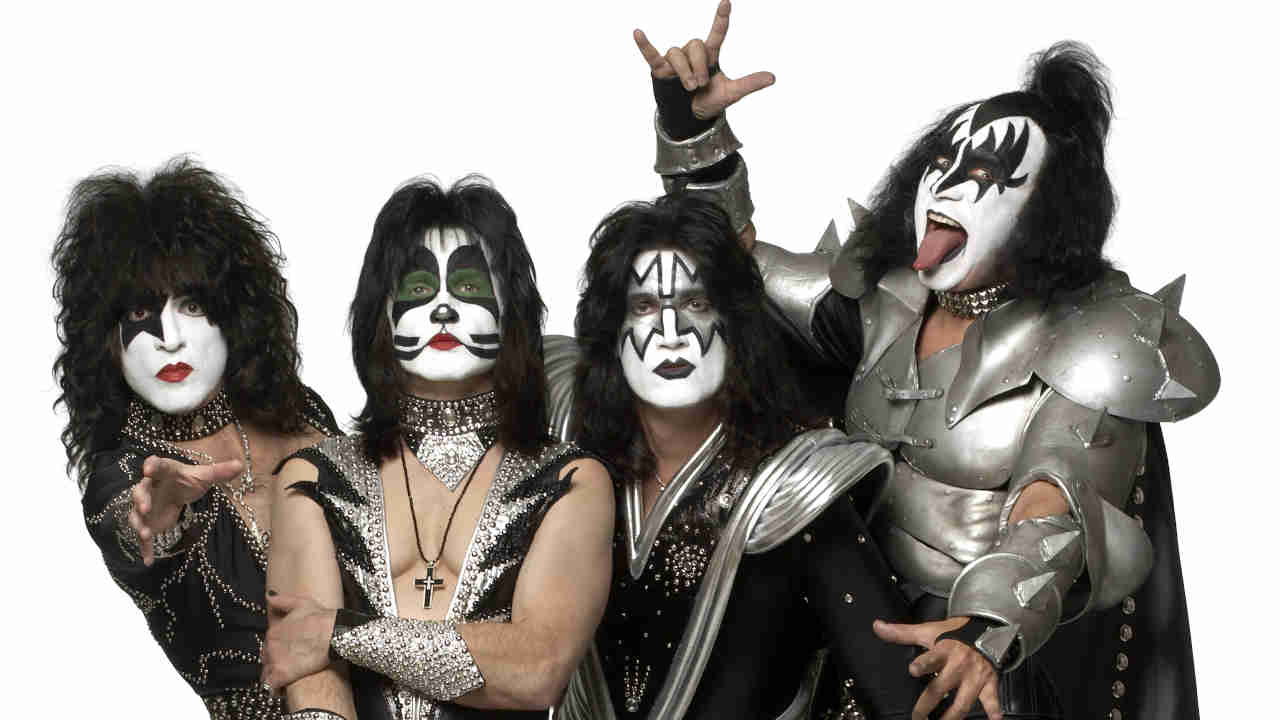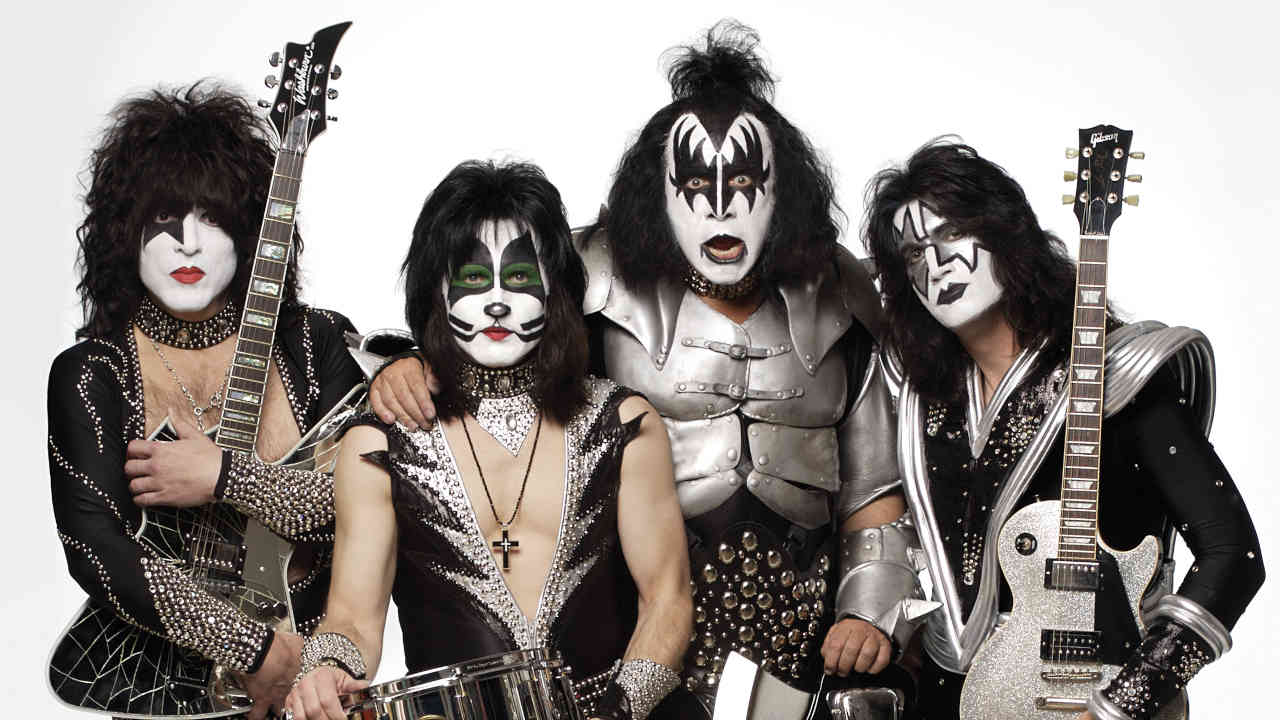Kiss’s 2009 album Sonic Boom was their first in 11 years – the result of a changing music industry and the rise of illegal downloading. But when Classic Rock sat down with Paul Stanley in Las Vegas, the Starchild was as defiant as ever about his band’s place in the grand scheme of things.
“The record industry is dead. It’s six feet underground”
Thus spoke Gene Simmons at Kiss’s Download 2008 press conference. The assembled hacks wept into their Kiss Kleenex, gnawed their Kiss Biros and squirmed in their Kiss deckchairs as the bassist/vocalist continued his rant. Clearly agitated, Simmons explained that his band were refusing to record new material until illegal downloading ceases, calling the act “uncivilised”.
Well, it’s now a little over a year later… and guess what’s due to hit the stores in a few weeks? A brand spanking new Kiss studio album, that’s what. Eleven freshly recorded songs for you – and Gene, no doubt – to drool over. Illegal downloading certainly hasn’t ceased, in fact it’s as rife as it ever was. So what in tarnation happened?
“Well, I may have a lot of talents but I’m certainly not a ventriloquist,” chuckles Paul Stanley. “Gene wasn’t speaking for me, or us. Sometimes he dives in headfirst. For me, it was only ever a matter of: if we are ever going to do another Kiss album, I want to be in charge. That was always the prerequisite for me, whether there was a market for it or not. I simply wasn’t interested in doing a half-assed Kiss album.”
Stanley is in Las Vegas, vacationing with his family before, he says, “all hell breaks loose,” unwittingly name-checking a track from Kiss’s Lick It Up album. His phone buzzes constantly during our chat, its ringtone alternating between Led Zeppelin’s Good Times Bad Times and Black Dog. (“How cool is that? That says everything when your phone rings Black Dog, huh?”)
The view from the Starchild’s penthouse hotel suite is spectacular: serried rows of skyscrapers with their bolt-on casinos basking in the haze of the early-morning Nevada sunshine. Stripped of its night-time neon blanket, many people reckon Vegas is tawdry by daylight. We suppose the same could be said of Kiss without make-up. But Stanley, for one, looks in fine fettle to us. Tousled black hair, crisp white shirt, distressed denim trousers, lounging on a white leather sofa as big as a battleship.

“It wasn’t difficult to talk Gene around,” the rhythm guitarist/vocalist insists. “It was interesting that everyone was very, very positive about the idea [of making a new album]. The ground-rules were laid down and I have to say that Gene was selfless – which is not characteristic of him. He was a team player and dedicated to putting his all into it. I expected everyone to commit 100 per cent. And they did.”
The result is Sonic Boom, Kiss’s first studio offering since 1998’s Psycho Circus. Stanley is calling it “bar none our best album in 30 years, if not our best album period”. A newly enthused Gene Simmons reckons “it may be our best album since Destroyer – it’s Rock And Roll Over meets Love Gun”. Classics all, indubitably, but these are highly ambitious claims. Aren’t Kiss setting themselves up for a fall?
“Well,” Stanley considers, “I’ve listened to Sonic Boom from beginning to end many times – as you can imagine, because I produced it – and I can’t remember an album we’ve done that’s as consistent. The batteries are fully recharged.
“The problem in bands sometimes is that you have to compromise based on issues other than quality of music. You end up trying to satisfy band members’ demands for equality. You wind up with hurt feelings. And all that does is weaken an album. Sonic Boom doesn’t have that; Sonic Boom has 11 great tracks. If it wasn’t great, it didn’t get recorded. It literally didn’t get past the rehearsal point.”
Lapsing into his on-stage role as the platform-booted rock’n’roll preacher, Stanley proclaims: “This wasn’t an exercise in pandering, or stroking somebody’s insecurities or neuroses, this was about making a great album that is unequivocally Kiss.”
Of course, the passage of time will determine Sonic Boom’s eventual resting place in the Kiss kanon. But having heard the new album, the first flush of listening frenzy doesn’t give us cause to dispute Stanley’s claims. The band promised us a balls-to-the-wall, back-to-their-roots album and that, it appears, is exactly what we’ve got.
“If I find fault with any of Kiss’s early records, it’s the sonic quality of them,” Stanley reflects. “I was never a fan of the range of fidelity of those first few albums, so there’s certainly more bombast, if you like, to Sonic Boom. I didn’t want to make a retro album. I don’t want to be nostalgic. I just want to be great. I just want to be Kiss.
“We recorded Sonic Boom in the old-fashioned, analogue way,” he continues. “I have nothing against ProTools; it’s a technological marvel. However, the great albums that you and I love were not made under a microscope. They were made by living, breathing people who were excited by what they were doing. Looking at a graph on a computer screen while you’re recording a song is absurd. Great music is decided by your ears, not your eyes.”
The on-sale date of Sonic Boom more or less coincides with release of Anomaly, the new solo album by ex-Kiss guitarist Ace Frehley. Does Stanley regard that as unfortunate timing?
“For who? Look, it’s a hard question for me to answer. Sonic Boom took us months to do. Ace’s album, from what I understand, took him 15 or 20 years. I can’t say anything about the timing or the release schedule. All I can say is, I hope Ace is happy and I think it’s terrific that he’s alive. Anything else is a bonus. I wish him well.”
The names might change but the faces stay the same. Tommy Thayer took over Ace’s Spaceman role in 2002 and Eric Singer, who had enjoyed two previous stints in Kiss, reclaimed the Kitty Kat drum-stool from Peter Criss in 2004. Sonic Boom sees the pair stepping boldly out of their sideman shadows, Singer contributing lead vocals on All For The Glory, Thayer writing and singing lead on When Lighting Strikes. Stanley says plainly: “Well, Tommy and Eric have a lot to offer, y’know? Anybody who saw our recent shows through Europe, South America and Canada knows that the band as it stands today is vital and pretty lethal.”
The cover to Sonic Boom echoes the artwork of Kiss’s Rock And Roll Over album, released in 1977. The same artist did both: Michael Doret. Why him and not the guy many reckon to be the Kiss album cover maestro, Ken (Destroyer, Love Gun) Kelly?
“Ken did great covers but it wasn’t the way to go this time. I thought we needed something more graphic. I wanted a cover that, as soon as you saw it, would emotionally or viscerally make you know what was on the inside of the album. I wanted somebody who connected us to what some people think are our finest times. So I sat with Michael and just thought this would be the way to go.
“Also,” Stanley qualifies, “Ken Kelly has connections with… I can’t remember the name, the band with the loincloths and all that stuff [Manowar]. All that barbarian nonsense.”
Most of Kiss’s key albums contain a killer ballad, something that’s missing on Sonic Boom. “Yes, purposely,” Stanley reveals. “It was too predictable: the obligatory ballad. We did have a great song – and Eric was very keen on singing it. But it wasn’t necessary. What was important was to capture the vitality and the focus of some of the earlier Kiss albums – and I think that’s what we did.”

Classic Rock had its first listen of Sonic Boom in the company of Doc McGhee, Kiss’s manager. Reflecting on his charges’ longevity, McGhee compared them to James Bond – and also Mickey Mouse. Is Stanley comfortable with the latter analogy? “Um, it wouldn’t be the one that first comes to mind. Do I think we’re like Mickey Mouse? I would rather find a better comparison. But we’re certainly iconic – whatever that means, however you define that.”
Kiss made headlines earlier this year when they put their fans in charge of routing their US and Canadian tours. Rumour has it the same tactic will be employed next year when they return to play the UK. Isn’t this rather dangerous? They could end up with gigs in Grimsby and Darlington.
“I can remember when we literally played every block in England – I think it might have been the Adrenalize tour,” Stanley laughs. “No decisions have been made on us doing a fan-routed British trek. But who knows, if it does happen we might end up playing Stafford Bingley Hall again [scene of triumphant Kiss shows in the early 1980s]. What a magical place that was. That was spectacular.”
Right on cue, a huge chunk of Vegas neon sparks into life just beyond the penthouse window.
“That was spectacular,” Stanley repeats.
Well, he should know. After all, ‘spectacular’ has been Kiss’s mantra for 35 years or more…
This interview first appeared in Classic Rock issue 137, published in September 2009


